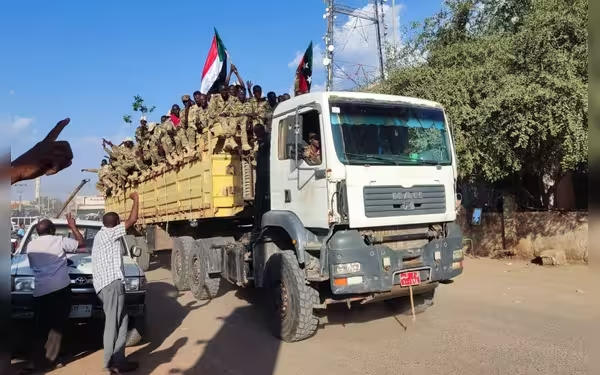Saturday, November 16, 2024 07:48 PM
Sudan Faces Extreme Violence and Humanitarian Crisis Amid Ongoing Civil War
- Over 20,000 deaths reported in Sudan's civil war.
- UN calls for immediate ceasefire to protect civilians.
- Severe food insecurity affecting millions, especially children.
 Image Credits: arabnewspk
Image Credits: arabnewspkSudan endures extreme violence and a humanitarian crisis as civil war escalates, with over 20,000 deaths and millions displaced.
Sudan is currently facing a dire humanitarian crisis, marked by extreme violence and suffering that has persisted for over 18 months. The civil war, which erupted in April 2023, has led to devastating consequences for millions of civilians. The conflict primarily involves two rival factions of the military government: the Sudanese Armed Forces (SAF) and the paramilitary Rapid Support Forces (RSF). As these groups continue to clash, the situation has escalated, particularly in the eastern state of Al-Gazira, where recent attacks have been described as some of the most brutal violence seen in the past year and a half.
According to the United Nations, the ongoing conflict has resulted in the deaths of at least 20,000 people and left over 33,000 injured. The war has also triggered the worst displacement crisis in the world, with more than 11 million individuals forced to flee their homes within Sudan, while an additional 3 million have sought refuge in neighboring countries. Human rights organizations have reported horrific violations, including widespread sexual violence, primarily targeting women and girls.
Rosemarie DiCarlo, the UN’s undersecretary-general for political and peacebuilding affairs, has condemned the relentless attacks by the RSF and the indiscriminate airstrikes by the SAF on populated areas. She emphasized that both warring parties share responsibility for the atrocities and must be held accountable. DiCarlo described the situation as a “man-made disaster” and called for an immediate ceasefire to protect civilians caught in the crossfire.
Ramesh Rajasingham, director of the UN’s Office for the Coordination of Humanitarian Affairs, highlighted the alarming levels of food insecurity in Sudan, particularly in regions like Darfur and Khartoum. Thousands have died from malnutrition, with children being the most affected. In the Zamzam displacement camp in North Darfur, 34 percent of children are facing malnutrition, with 10 percent suffering from severe cases.
Despite the opening of the Adre border crossing from Chad, which has provided some relief, humanitarian organizations stress that this is not enough to address the scale of the crisis. They require safe and unimpeded access to deliver aid effectively. Rajasingham urged the international community to provide flexible financial support for relief operations and to advocate for a ceasefire agreement.
Unfortunately, despite international pressure, progress towards peace talks has been minimal. Both the RSF and SAF continue to escalate their military operations, supported by a steady influx of weapons. DiCarlo pointed out that certain allies of these factions are enabling the violence, calling for an end to this “unconscionable and illegal” external support.
While efforts to mediate the conflict have been fragmented, there is a glimmer of hope. The African Union and the Intergovernmental Authority on Development are working to restore political dialogue and facilitate a peaceful resolution. Additionally, the Aligned for Advancing Lifesaving and Peace in Sudan Group is promoting key peace initiatives, including the Jeddah Declaration, which aims to protect civilians.
As the conflict shows no signs of abating, the need for greater convergence among international actors is clear. The UN has proposed establishing a compliance mechanism to hold the warring parties accountable for their commitments to civilian protection. The situation in Sudan is a stark reminder of the urgent need for global solidarity and action to alleviate the suffering of innocent civilians caught in the crossfire of war.













